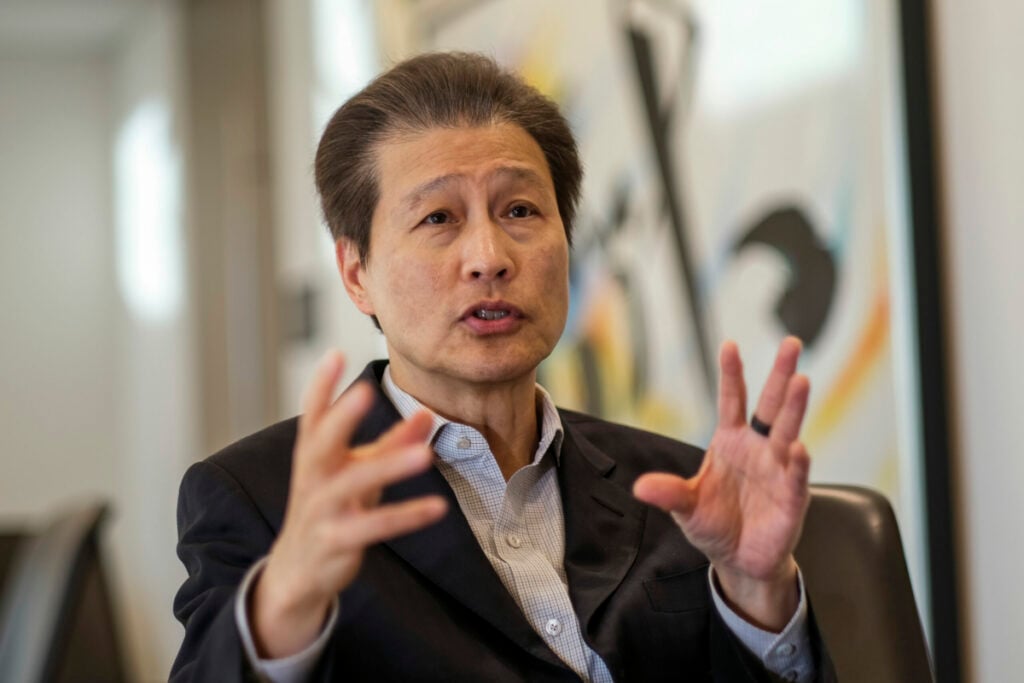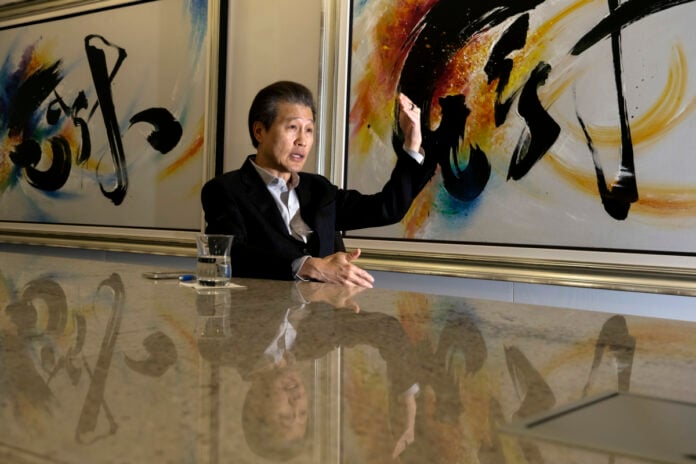Fresh after returning from the Asia-Pacific Economic Cooperation conference in Thailand, Dominic Ng, as the new chair of the group’s Business Advisory Council, seems eager to host the crew for next year’s big event, to be held in San Francisco.
It was a subtle eagerness. Though he’d just been appointed to the body in April and was named the incoming chair in July, Ng talks about ABAC — the portmanteau of APEC, the inter-governmental forum composed of 21 member economies, and the business
advisory council — like a seasoned member.
He talks facts, ideas and goals about trans-Pacific trade like a man who has spent 30 years transforming Pasadena’s East West Bank into Southern California’s largest publicly listed independent bank based on its forays into the Asia Pacific market, because that’s exactly what he did.
In many ways, Ng, chairman and chief executive of East West Bank since 1991, was made for this role.
“We are one of the only banks in the country that really pride ourselves with the unique value proposition that we understand, and also have the expertise of, U.S. and Asia trade and investment,” Ng said in a recent interview at East West Bank headquarters. “For years, we have always had the same mission. Obviously not only myself, but a lot of my colleagues at East West Bank have very strong expertise and knowledge about the Asia Pacific region.”
What the job is
As a United States representative to ABAC, Ng and his peers from other nations are tasked with advising the international group’s governments on policy recommendations to promote trade and investment between each other, as well as sustainable growth in each of the member economies. They meet four times a year, culminating with the major November summit in which the advisory council presents its deliverables in terms of recommendations and the research to back them up.
Members of APEC are the United States., Australia, Brunei, Canada, Chile, China, Hong Kong, Indonesia, Japan, Malaysia, Mexico, New Zealand, Papua New Guinea, Peru, the Philippines, Russia, Singapore, South Korea, Taiwan, Thailand and Vietnam. Ng’s career in building a banking empire with connections to many of these nations likely played a role in his appointment this year.
“These are the regions we know pretty well. We have a lot of customers that have their factories and plants set up in those regions. Many of them export to the U.S. We have plenty of American businesses that import goods from those regions,” he said. “We also have plenty of American businesses that not only export to those regions, but some of them actually set up overseas operations in China, in Vietnam, in Thailand that we do banking with.”
Ng said key points addressed last month at the Bangkok meeting — which he co-chaired — were largely based on economic conditions that persisted throughout the year: continued recovery from the Covid-19 pandemic, global inflation and a rise of fuel prices, unclogging the supply chains and fallout from the Russian invasion of Ukraine.
“Our recommendation was to encourage government leaders to do more in terms of ensuring that not only (bring) back a more reserved economic environment and make sure we resolve these supply chain and food security issues,” Ng explained, “but also highlight that we need to pay special attention to the small businesses, particularly for (those owned by) women, the indigenous community and the minority community. That is something we also feel will resonate well with a lot of our leaders.”
Ng added that there is a continuing emphasis on helping smaller entities digitize as a way of entering the global market. This, he said, provides a strong basis for public-private partnerships.
“Through e-commerce, oftentimes, small businesses can do a startup and then start selling to all over the Asia-Pacific region without having restrictions like in the old days when only multinational (companies) could have international territories and so forth,” he said. “We continue to encourage governments to provide financial incentives to help, let’s say, banks to provide financing to small business and provide financing to help build sustainable projects.”
Moving more enterprises into the digital world, Ng continued, will benefit the organization’s members and regional economies in a multitude of ways.
“In the trade-finance sector, it’s still very paper-intensive — paperwork like invoices, shipping documents, all of this paperwork to do one trade transaction,” he said. “For the smaller companies who have to do all this paperwork, not only is it cumbersome for them, but in addition to that, it is environmentally damaging.”
Getting along
In spite of the real and perceived differences between each member nation and economy (Hong Kong was admitted as a British colony, before becoming a special Chinese economic zone, and Taiwan, though not recognized as a nation, is recognized as an independent economic entity), Ng said it was relatively straightforward to identify mutual tracts of business interest.
One example of sharing such ideas, Ng pointed out, comes from Los Angeles. Here, Filipino immigrants have largely adopted use of an app to send remittances back to their families in the Philippines at a significant discount from usual money transfers. This is an idea that could take off in such a place as Hong Kong which also has a large number of Filipinos in the workforce.
“At the APEC meeting, we were very focused on dealing with sustainability, helping small- and mid-market enterprises, and supporting the indigenous communities and women’s businesses,” he said. “These kinds of things are universal.”
Although APEC is expressly not a political organization, Ng conceded that improving economic relationships and living standards across nations plays a complementary role to politics and diplomacy.

“When there is more economic cooperation, more trade and investments with one another, it just makes business better connected and there’s more people-exchange when you have to do commerce together,” Ng said. “Despite the political rhetoric between the U.S. and China, at the end of the day, (President Joe) Biden and (Chinese Premier) Xi Jinping still end up spending three-and-a-half hours talking to each other, because you cannot have the largest and second-largest economies just completely decoupled from each other.”
And decoupled they are not. Ng noted that his bank’s trade business slanted heavily toward imports when he took the helm 30 years ago. In that time, China’s economy has, perhaps not coincidentally, ballooned.
“I would say 30 years ago, my trade finance business at East West Bank, 90% were imports. We hardly had any exports,” he said. “We have a pretty balanced import-export business now, because there are so many goods coming out of the U.S. to, for example, China, because the consumer market in China is so strong not only in terms of numbers, but the GDP per capita has grown so much. The savings rates are so high they can consume in a big way.”
What is California sending to China? Trademark exports such as strawberries, oranges, nuts and wine — goods that don’t constitute much of a national security risk, Ng observed.
Moving forward
Ng said promoting sustainability and environmental stewardship as a common thread is a key part of the fight against climate change, especially given the strength of its members. The United States, China and Japan are the world’s top three nations in terms of GDP, and they are among 10 of APEC’s members who are within the top 21 of this metric.
“That area, we found strong consensus from the economy leaders. They resonated (with) our concerns and the proposals that we recommended,” he said. “I do feel that some of these government leaders will take our recommendation and potentially implement all the new policies for their specific economy.”
We understand and also have the expertise of U.S. and Asia trade and investment.
Dominic Ng
East West Bank
One focus of his for 2023, Ng said, is that the group’s big dogs will have to help lift their peers up.
“As the strongest economy among the 21 members, the U.S. not only has to step up to do what we need to do to protect our own country, but the U.S., Japan and China will need to actually take on additional responsibility to support some of the smaller, developing nations,” he said. “Obviously for a country like Indonesia or Vietnam, they may not necessarily have the financial capability to convert…to a new energy platform. The U.S. has the technology, the know-how, the capability to actually put the project together and also finance it.
“China just completed a high-speed rail for Indonesia. That’s what China does,” Ng continued. “They’re a whole country full of high-speed rail. They do this like it’s a piece of cake. They know exactly what to do, and they have the financial wherewithal. If they need financing, they can do the financing.”
New deal
Free trade continues to be part of the discussion, as does adding more membership to the forum — particularly from Central and South America. Although former President Donald Trump pulled the United States out of the Trans-Pacific Partnership free-trade agreement — which included many APEC members — other nations cobbled together a similar agreement in its wake. Though ABAC is not as involved in those talks, Ng said he expected APEC to keep exploring free trade between Asia and the Americas — an agreement likely to take advantage of the Port of Los Angeles and Port of Long Beach being the two busiest ports in the United States.
“We’re still working on a free-trade zone. For example, maybe the U.S. would make an exemption for a certain type of industry and Japan and China would do the same thing, but in between, if we can allow enough free trade, we think that that would be beneficial to all these nations,” he said. “It’s part of that discussion. We continue to advocate something similar to the Trans-Pacific initiative that was put together by the Obama administration.
Whether the Biden administration will be able to follow through, that’s something we willhave to see. That’s a tough one.”
On a similar vein — and again, in a multifaceted approach — Ng said there are also discussions on zeroing out tariffs on products contributing to environmental sustainability.
This could help make California’s transition to renewable energy sources more palatable for residents and businesses shopping for things like solar panels.
“If we can do that, I think it will dramatically improve the ability for the U.S. and other nations to better battle climate change,” he said.

